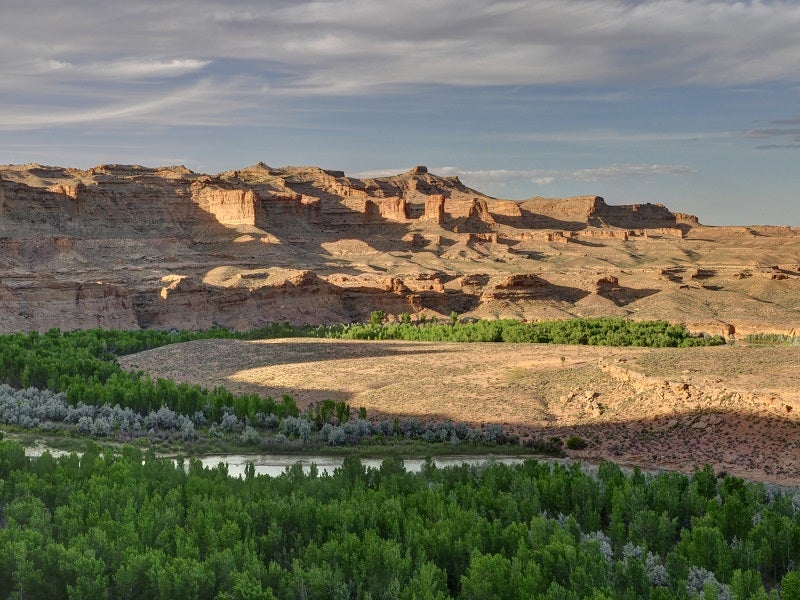Groups to Feds: Plan for America’s First Commercial Oil Shale Facility Not in Public Interest
Strip mining plan threatens land, water, wildlife, climate
Contact
Fourteen conservation groups submitted formal comments to the Bureau of Land Management’s Vernal Field Office Tuesday urging the Obama administration to deny rights-of-way across federal public lands that would allow an Estonian energy giant to sidestep environmental review and pave the way for the first commercial oil shale project in the United States, north of Utah’s scenic Book Cliffs. The groups also delivered more than 35,000 comments from citizens opposed to the project.
Map by Stephanie Smith / Grand Canyon Trust
View larger image.
The BLM is moving forward to grant utility rights-of-way to Enefit American Oil, a subsidiary of Estonian government-owned Eesti Energia. Enefit seeks to strip-mine 9,000 acres for oil shale near the Green and White rivers, and ultimately expand its operations to process up to 1.2 billion barrels of kerogen oil.
“The BLM is charged with safeguarding the American public interest and our national inheritance—our federal public lands,” said Anne Mariah Tapp, energy program director for the Grand Canyon Trust. “But instead the BLM is preparing to flip the ‘on’ switch for Enefit’s massive oil shale strip mine and jumpstart development of one of the world’s most polluting industries. The interests of an Estonian mining giant should not trump those of the American public.”
The groups argue the BLM would be allowing Enefit to sidestep critical environmental reviews designed to protect public health, land, air, water, and wildlife. The company has yet to reveal a development plan for its mining project, but requests approval for its rights-of-way nonetheless.
“Enefit’s massive strip-mining and refining operations will unleash significant air and climate pollution in an area that’s already suffering from some of the nation’s most unhealthy wintertime smog,” said Ted Zukoski, an attorney with the pro bono law firm Earthjustice. “But Enefit has refused to provide federal agencies or the public with information about the project’s air and climate pollution until after it gets BLM’s okay to start building access for water, power, and roads. That’s backwards. Enefit can’t be allowed to game the system by getting federal approval first, but only owning up to the project’s damage later.”
The groups’ comments assert that the rights-of-way would amount to a federal subsidy.
“The Interior Department is working against President Obama’s climate goals here,” said Taylor McKinnon, with the Center for Biological Diversity. “Subsidizing the development of one of the world’s dirtiest fossil fuels is the opposite of climate leadership. Doing so in the Colorado River Basin is the opposite of prudent water policy. The administration should abandon this project now.”
The BLM lacks critical information it needs to assess whether or not the project is in the public interest, including the long-term air quality and climate impacts of emissions from mining and processing; the quantity and source of water required; water-quality impacts related to the estimated 23 million tons of spent shale waste a year the project would produce; and potential consequences for endangered species.
Amy Mall, a senior policy analyst with the Natural Resources Defense Council’s Land and Wildlife Program, said: “It’s unfathomable—and inconsistent with the administration’s climate goals—for BLM to give Enefit access to public lands so it can damage them, threaten surrounding communities, and worsen both air quality and climate change. Enefit has not provided enough data on the potential impacts of its mining project and BLM shouldn’t make a decision based on an incomplete environmental assessment.”
Local groups draw attention to threats to Utah. “The utility corridor will facilitate a massive oil shale development that will further compound the damage to Utah’s air, water, wildlife, and land,” said Denni Cawley, executive director of Utah Physicians for a Healthy Environment. “This is not the right direction to go to secure a sustainable future for those who live in that area.”
“Shale waste runoff will contaminate Evacuation Creek, the White River, and the Green River, which are all important for the recovery of endangered fish, and for communities downstream,” said John Weisheit, conservation director for Living Rivers.
An Estonian environmental advocate recently stated in an op-ed in the Salt Lake Tribune that in her country “the oil shale industry has permanently damaged many of our most important natural resources” and warned Utahns against similar harm.

Additional Resources
About Earthjustice
Earthjustice is the premier nonprofit environmental law organization. We wield the power of law and the strength of partnership to protect people's health, to preserve magnificent places and wildlife, to advance clean energy, and to combat climate change. We are here because the earth needs a good lawyer.